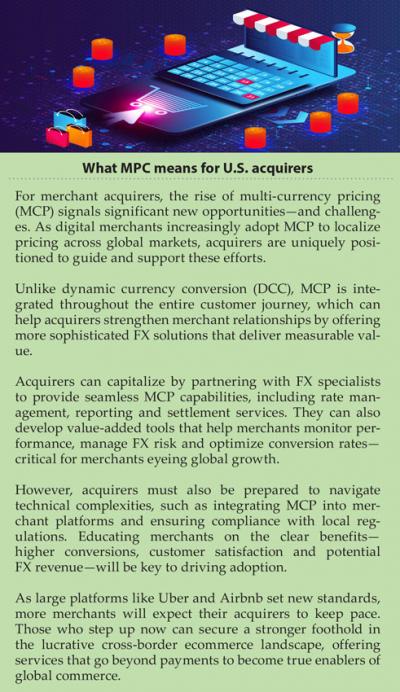The Green Sheet Online Edition
May 12, 2025 • 25:05:01
Are issuers losing the FX game to merchants like Uber?

The buy now, pay later (BNPL) revolution transformed consumer credit by allowing merchants to absorb credit costs to boost conversions and increase basket sizes. Now, a similar disruption may be emerging in the foreign exchange (FX) space, and credit card issuers are feeling the heat.
Recently, Uber introduced a new currency localization service aimed at improving user experience for international travelers (see bit.ly/44xg3xk). The premise is straightforward: When a British tourist lands in New York, they want to see their Uber ride prices in GBP, not USD. To cater to this preference, Uber now charges a 1.5 percent markup for currency conversion—an offering likely to spark debate, but also one that presents a clear value proposition.
Why? Because according to research from PSE, UK credit card issuers currently mark up FX rates by an average of 2.94 percent. Suddenly, Uber's 1.5 percent markup looks like a bargain.
A quiet revolution
The idea of merchants capturing a slice of the FX margin isn't new. For years, dynamic currency conversion (DCC) was the primary tool for merchants looking to monetize FX. However, DCC has several drawbacks: it requires explicit consumer opt-in, adoption rates rarely exceed 20 percent, and revenue has to be shared with acquirers and FX specialists.
More recently, multi-currency pricing (MCP) has gained traction. Unlike DCC, MCP allows for currency localization throughout the entire online journey, not just at the point of checkout. This approach aligns well with the growing demand for seamless, cross-border shopping experiences and has become feasible thanks to advancements in digital shopping platforms and content management systems.
Airbnb has been an early adopter, refining its currency localization approach over several years (see www.airbnb.co.uk/help/article/95). According to PSE's recent survey of major digital merchants, nearly two-thirds already offer currency localization, and many others are planning to invest in the near future. The enthusiasm for currency localization among digital merchants and PSPs is only growing.
Why merchants are eager to offer MCP
For merchants, the incentive to offer currency localization is twofold:
- Direct FX markup: Merchants have the freedom to adjust FX rates to their advantage. Surprisingly, nearly half of the merchants surveyed choose not to mark up FX rates at all, offering the service for free to enhance customer experience and loyalty.
- Increased conversion: Consumers prefer to see prices in their local currency, which often leads to higher conversion rates. Survey findings indicate that MCP can boost conversions by as much as 5 to 10 percent—a significant win for merchants where incremental gains make a considerable difference to profitability. The principle of selling more beats the cost of payments is proving true in the FX space, too.
The operational hurdles of MCP implementation
While the benefits of MCP are clear, implementing the system is no simple task. Merchants face several challenges:
- End-to-end journey Localization: Offering localized pricing requires adjustments from the moment a user lands on a website, not just at checkout. This involves seamless integration with Content Management Systems (CMS) and collaboration across various departments.
- FX risk management: Cross-border transactions can take up to 72 hours to clear. To mitigate this risk, many merchants lock in rates with FX suppliers for up to three days. Allowing rates to float can be hazardous, particularly in volatile markets.
- Supplier limitations: While global banks offer robust FX services, they often fall short when it comes to handling refunds or generating internal reports, forcing merchants to create their own operational frameworks.
- Currency coverage: Successful MCP implementation requires supporting a broad array of currencies. Most merchants offering MCP cover between 30 and 50 currencies, but supporting less stable or regulated currencies presents additional challenges.
Should issuers be paying attention?
Since the European regulation of interchange fees, FX revenue has become a lifeline for card issuers.
However, Uber's move—and similar initiatives by other large digital merchants—presents a clear threat. If consumers can access a cheaper, more convenient FX service from merchants directly, why would they continue to rely on their card issuer's more expensive offering?
Much like BNPL, the appeal of MCP lies in the merchant's ability to absorb some of the costs to enhance customer satisfaction and drive sales. And although rolling out MCP requires careful planning and substantial investment, the rewards are well worth the effort.
With players like Uber now stepping into this space, it's only a matter of time before more companies follow suit.
Issuers must act quickly to retain their grip on FX revenue streams. The future of cross-border payments may very well be dictated not by banks or card networks, but by the merchants themselves. 
Chris Jones manages PSE Consulting's business and is well known in the UK and EU for his regular insights into payments innovation. He has spent the last 20+ years leading assignments for major clients during his time at PSE and Accenture. His specializations include customer proposition development, market entry strategies and enterprise value creation. Contact him via email at info@pseconsulting.com or on LinkedIn at linkedin.com/in/chrisjonespse. To learn more about PSE, a provider of payment advisory services to professionals across the payments landscape, visit https://pseconsulting.com.
Notice to readers: These are archived articles. Contact information, links and other details may be out of date. We regret any inconvenience.





